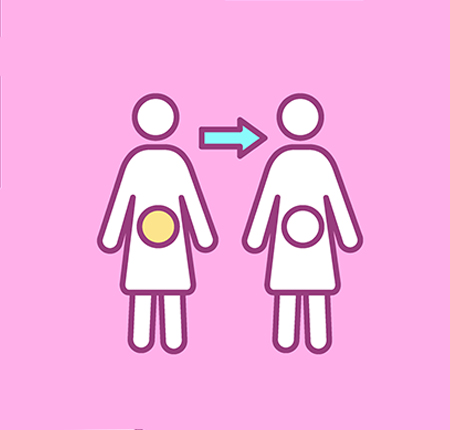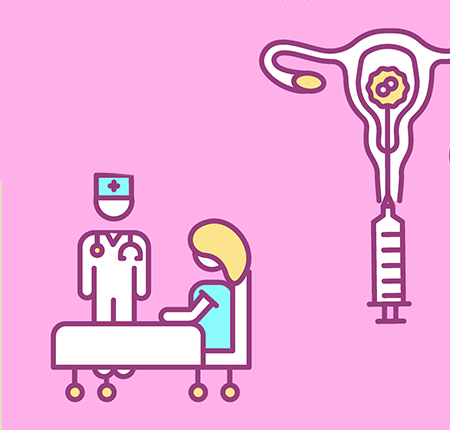
A surrogate mother is a woman who gives her consent, based on a notarized contract, to have a pregnancy and give birth to a child for another couple, usually infertile. After the birth of the child she will freely renounce any parental rights.
Surrogate mother: what does it mean and what is the legislation in Romania?
In many countries (Spain, Holland, France) this practice is strictly prohibited by law, while in others (Belgium, Ukraine, Georgia) it is allowed. On the other hand, Romania is currently facing a legislative deficit when it comes to this issue. Although a set of measures have been taken since 2012 to legalize surrogacy, the draft law has not been finalized and the Government has not offered any solution for this procedure.. Not every woman can become a surrogate mother or beneficiary mother. The draft law on surrogacy, proposed in 2012, clearly states that a surrogate mother must be between 18 and 40 years of age, and the recipient mother must be between 18 and a maximum of 47 years of age.
What does surrogate mother mean?
What does the surrogate entail? By definition, surrogate mother is that person who carries a pregnancy and gives birth to a child to be raised by other parents. Depending on the procedure used, the child may be related to the surrogate mother or may have only the DNA of the recipient parents. Regardless of the genetic material used, the surrogate mother is considered only a surrogate mother, and she waives her parental rights through a notarized contract.

Most of the time couples turn to this solution because they are experiencing reproductive problems, whether we are talking about sterility or infertility or same-sex couples.
Types of surrogate mother
There are two different types of surrogate mother. The difference lies in the genetic material used and the degree of kinship of the child with the surrogate mother.

Traditional surrogate
A traditional surrogate mother donates her own egg and gives birth to a child for an individual or a couple. In this case, intrauterine insemination (IUI) with sperm from the recipient father is used to achieve a viable pregnancy. The sperm of an external donor can also be used if we are talking about a child carried for a couple with fertility problems or a couple of the same sex.
Gestational surrogate
In the case of a gestational surrogate mother, an egg that is not the carrier's is used. The egg can come from either the intended mother or a donor. The sperm can also come from the intended father or from a donor. Pregnancy is achieved through in vitro fertilization (IVF).
Who calls on a surrogate mother?
There are many reasons why people choose to have this procedure. Most of the time they are related to sterility or infertility, but there are also cases where the reason is different. A surrogate mother is most often used when:
There are health problems that prevent a woman from becoming pregnant or carrying a pregnancy to term.
There are infertility issues that prevent couples from getting pregnant or carrying a pregnancy to term. An example would be recurrent miscarriages.
Same-sex couples want to have children. Most often this option is used by male couples.

How to find a surrogate mother?
The process of finding a surrogate mother is not exactly easy. Some people are lucky enough to be able to turn to a friend or family member who is willing to help them.
Others turn to surrogacy agencies – often set up abroad – to find the right person. Agencies conduct several screenings to ensure that potential candidates meet the criteria associated with the process. Those that pass the test are then compared with the list of wishes/needs of the beneficiary parents to choose the perfect option for them.
Surrogate mother in Romania - What does the law provide?
At the level of the European Union, surrogacy is a thorny issue. The European Parliament is of the opinion that it is necessary to protect the dignity of every human being. The European Union condemns surrogacy and considers it a universal crime that compromises women's physical integrity and children's rights, increasing the commercial exploitation of their bodies and reducing the person to the level of a commodity. The EU also rejects any misuse of the human body involving reproductive exploitation for mere economic or other return and calls for more guarantees for women's rights, especially for vulnerable women living in developing countries. Parliamentarians believe that the practice of surrogacy should be addressed through international legislative instruments for the protection of human rights.
In Romania there is no finalized draft law establishing the legal procedure behind the surrogacy process. Thus, although it is not illegal to be a surrogate mother, the process is not legally ratified either, making the whole route unclear and arduous. From a legal point of view, it is only stipulated that single women and infertile couples have the right to use the services of a surrogate or surrogate mother.
Legislative issues that may arise
As mentioned above, there are a number of legislative issues that can arise due to the fact that surrogacy is not clearly defined legally. Some of the most common problems are bureaucratic. For example:
- the name of the surrogate mother and the father who donated genetic material appear on the child's birth certificate
- only after the surrogate mother waives her rights over the child through a notarial contract will the beneficiary mother be able to adopt the child
- thus a new birth certificate will be issued in the name of the beneficiary parents
Also, the lack of a clear legal procedure can lead to other problems.
The surrogate mother must hand over the child to the beneficiary parents within 48 hours and stop any contact with him, thus it is necessary to find an alternative for breastfeeding.
There are cases where the notarial contract is not drafted well enough, thus giving the surrogate mother the opportunity to change her mind if she became too attached to the child during the 9 months.
From a legal point of view, the child born through this method is considered adopted even if the genetic material used comes from both beneficiary parents.
Countries where surrogate mother is accepted
Legally, surrogacy is a complex issue in Europe.
In certain countries such as Austria, Germany, France, Norway, Sweden, Estonia it is totally prohibited.
Other countries such as Great Britain, Holland, Denmark, Portugal, Czech Republic, Ukraine, Russia, Belarus accept the surrogate as long as it is not a commercial one. However, it has been shown that the lack of strong legislation to ratify this procedure can create a real industry of surrogate mothers, as is happening for example in Ukraine.
Greece, Belgium, Spain and Finland neither prohibit by law nor regulate this procedure.
Outside of Europe, the country with the best ratified legal system regarding surrogacy is the United States of America.
Surrogate mother procedure in Romania
Once you have decided that you want to find a surrogate mother, the procedure differs depending on the process you choose.
In the case of gestational surrogate mothers , the process looks something like this:
Choose a surrogate mother, usually through an agency.
Go to a notary and sign a legal surrogacy contract
Go through the egg retrieval process (if using the recipient mother's eggs) or get eggs from a donor. Create embryos using the intended father's sperm or donor sperm.
Transfer the embryos to the gestational carrier (surrogate) and then - if successful the first time - monitor the pregnancy. If it doesn't work, the intended parents and surrogate mother can go through another cycle of IVF.
The child is born, at which point the prospective parents obtain full legal custody, as provided for in the notarial contract

On the other hand, traditional surrogates also donate their eggs, so IVF is not usually involved in the process, this one is a little different.
Choose a surrogate mother. This can also be from friends or family
Go to a notary and sign a legal surrogacy contract
Go through the IUI process using the recipient father's sperm or the donor's sperm.
Monitor your pregnancy or if the first cycle doesn't work, try again.
The child is born. The surrogate mother may have to legally relinquish parental rights to the child, and the intended parents may have to complete an adoption process separate from any legal contract established earlier in the process.
Conditions to become a surrogate mother
Not everyone can be a surrogate mother. Ideally, it is good to choose a person who meets the following criteria:
He is at least 21 years old
She has already given birth to at least one healthy baby, so she understands firsthand the medical risks of pregnancy and the emotional issues that can arise
He successfully completed a psychological screening to uncover any issues related to relinquishing the child after birth
Does not use prohibited substances or alcohol
He doesn't smoke
Ideally you would:
either married or in a stable relationship
does not suffer from chronic conditions that could affect the pregnancy such as diabetes or heart disease
is not undergoing any treatment for chronic diseases that could affect the pregnancy
Indications if you want to become a surrogate mother
The decision to become a surrogate mother is not an easy one, so you have to consider a number of factors if you want to choose this path, regardless of your reason. Whether you want to help a loved one or do a good deed for a stranger, it's important to remember that:
You will need to meet all the minimum requirements to be chosen - including age, health, reproductive history and psychological status
You will have to agree to give up control during pregnancy. Although it is your body, what happens during pregnancy is not entirely up to you. The process may involve tests or analyzes that you would not normally do, but which the beneficiary parents may want to do.
You will also need to think about the process itself. Getting pregnant through IVF requires a number of procedures and medications. It is good to consider how you will feel when taking hormones and other types of reproductive medicine
Consider that any pregnancy can involve a number of risks.
How much does a surrogate mother cost? Price details
In Romania, the surrogate mother contract is concluded free of charge. The legislative draft created for the surrogacy procedure stipulated that people who conclude such a contract with the aim of making money from it can be punished with imprisonment from 3 to 7 years. However, as the law has not been finalised, there are situations where surrogate mothers may aim to make profits.
However, although the contract is concluded free of charge, the surrogate mother must receive money from the future parents of the child for all investigations and medical needs related to the pregnancy, for transportation, accommodation and meals.
In some countries in Europe and beyond, commercial surrogacy is legal. For example, in the United States the costs for a surrogate mother vary between $90,000 and $130,000.
Important aspects to consider
When planning surrogacy, everything can seem quite simple. However, it is important to remember that unexpected events can occur at any time
It is good to keep the following things in mind:
IVF or IUI does not guarantee the development of pregnancy from the first. Sometimes these procedures don't work on the first or even subsequent attempts. You may need several cycles to get pregnant.
Even if the surrogate mother is perfectly healthy, miscarriages are possible.
As with traditional pregnancies, there is the possibility of pregnancy complications for both the surrogate mother and the child
IVF and IUI can often lead to multiple pregnancies - prepare for the possibility of twins or even triplets
No psychological screening can guarantee perfect behavior of the surrogate mother.























